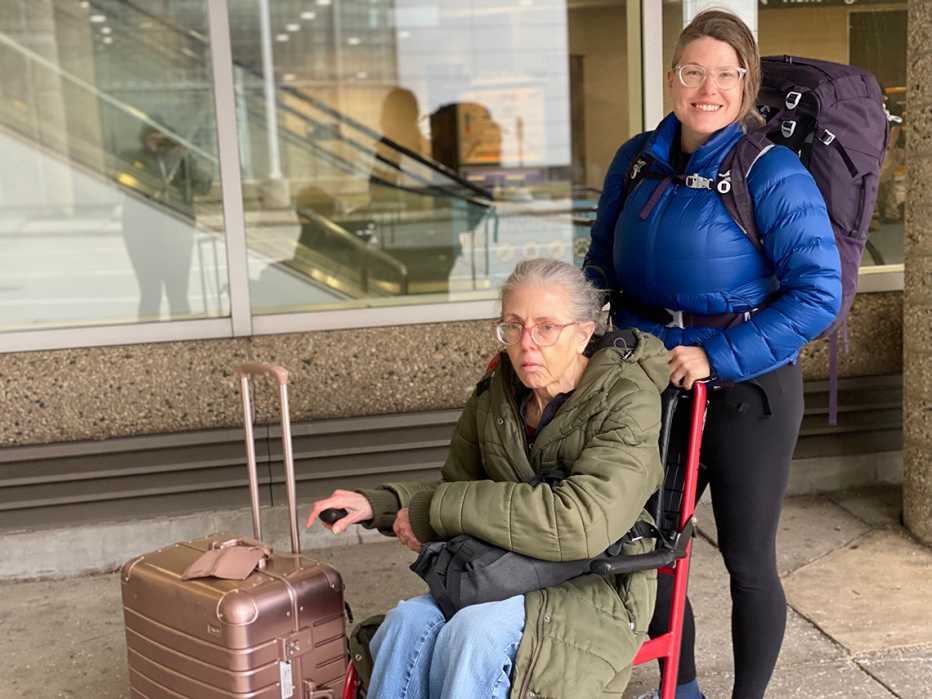AARP Hearing Center


My sister, Samantha Ruiz, and I were sitting on a patio in Madeira, Portugal, having afternoon tea and gazing out at the crashing waves of the Atlantic Ocean. It was the first day of our first vacation together in six years. Sure, work, kids, finances, and a global pandemic had made it difficult for us to travel together. But our main obstacle was caregiving responsibilities for our mother, who suffers from dementia and advanced Parkinson’s disease.
With virtually no extended family support and lacking the funds to pay for pricey overnight care (which runs about $250 per night), the idea of escaping to Madeira seemed like an unattainable dream. Last year, however, we learned about respite grants, and this January, we received a $4,000 grant from the Alzheimer’s Association of Wisconsin to cover care, funded through the National Family Caregivers Support Program (NFCSP).
Our mother, Beverly, who lost our father when we were in elementary school, was the strongest, most dedicated and supportive mother any child could have. She deserved to be cared for at home, living her last years in the house she and our father built and moved into mere months before he died. However, the amount of care and attention she required was exhausting, emotionally draining and unsustainable. Both Samantha and I were suffering from severe caregiver burnout.


For three years, we have been responsible for the day-to-day care of our mom — cooking, helping her get dressed, managing her medication, taking her to appointments. We also help her shower, brush her hair, and, on bad days, help her eat, drink, and brush her teeth. As her dementia symptoms worsen and include mild delusions, more time is spent reassuring her nobody is in the house trying to harm her, and hanging towels to cover windows, mirrors, and handles so she can’t be “spied” on. All of this is on top of working full time and raising kids.
Applying for a grant
By attending free workshops and conferences offered by the Wisconsin Parkinson’s Association and Alzheimer’s Association, we learned about grants provided through the Respite Care Association of Wisconsin (RCAW). To receive funding, we needed an eligibility letter from the Alzheimer’s Association, which submitted forms to RCAW on our behalf and helped us understand the grant process. (The letter states that we did not receive additional monetary support from another grant or assistance from Medicaid, but eligibility requirements vary across programs and states, so be sure to obtain clear guidance about how to qualify for respite support.) Last year, we received a $900 grant from the RCAW. This January, when I approached the Alzheimer’s Association about getting another eligibility letter, I asked whether they offer their own grants. As it turns out, they do administer national grants, but they run out very quickly, so we had to act fast.
In about two weeks, the Alzheimer’s Association helped us apply for, then approved, a $4,000 grant, which is the maximum amount they offer. Because we couldn’t receive two grants simultaneously, we opted for the larger Alzheimer’s Association grant. The RCAW told us that once that grant was exhausted (the organization pays the care providers directly), we would then be eligible to apply for their smaller grants, which are offered more frequently.







































































More on Caregiving
11 Housing Options for Those Who Can’t Age in Place
Older adults want to stay in their homes but can’t always
10 Ways Caregivers Can Improve Their Own Self-Care
Author reveals which strategies work best for her
A Place to Care for the Family Caregiver
Hospital-based respite centers can offer much-needed support and services